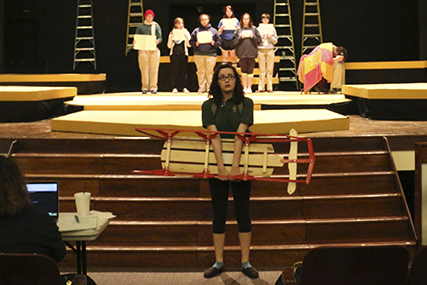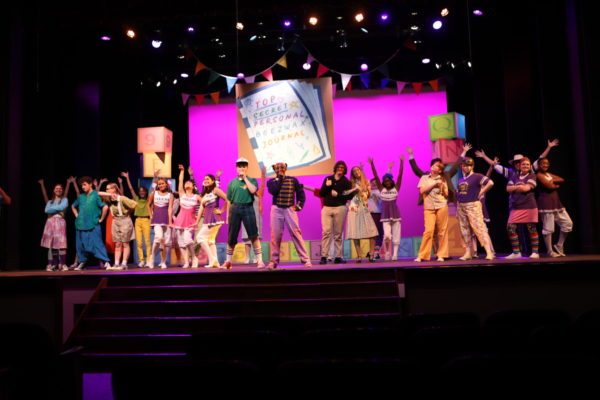Cast, crew to present ‘The Rose and the Rime’
‘A modern myth for the Middle West,’ Alexander says

Junior Ava Sweeney practices for her role as the lead in the fall play, “The Rose and the Rime” on Nov. 7.
Each year, Catheatre works hard to put on a spectacular fall play. This year is no different, with “The Rose and the Rime,” which opens Nov. 17 at 7:30 p.m. There will be two other performances as well: one on Nov. 18 at 7:30 p.m., and another on Nov. 19 at 3 p.m.
Director of Theatre Arts Ms. Jennifer Alexander said, “They call it a modern myth for the Middle West. Basically, reality meets fantasy. It’s about a town and the people in a town who have experienced winter for a generation, and now they are trying to break the curse of the town.”
To prepare for the show, there are many tasks to be completed including rehearsals and the tech crew building the sets.
Role of tech crew
While the actors may have the spotlight, there are many hidden jobs taking place to make the play great for everyone, including what Catheatre’s tech crew does.
Fine Arts Department Chair Mr. Michael Moffatt said, “Basically, tech theatre provides the set, the lighting, sound, props and costumes for the plays.”
All the work that needs to be done is distributed among several different groups. “I have four Tech 1 classes and one Advanced Tech class,” Moffatt said. “Then after school I have a crew who comes in, so they’re like a volunteer crew basically, and with that large group of people I coordinate the set build. And then after school we do lighting and sound, props, as well as building the set. And then we have the costume crew. I’m not the main instructor for the costume crew, I just kind of oversee it all, but there’s an adult who runs the costume crew.”
The volunteer crew consists of about 40 students.

Seniors Chris Basile, Elliott DeSanto, Liam Moore and junior Conor Berry work behind the scenes on Nov. 7.
Managers on deck
Senior Liam Moore is in an independent study tech class as well as putting in time after school for the fall play. He said, “For the fall play, ‘The Rose and the Rime,’ I am one of the deck managers with (senior) Joe Bustamante. Our role is to oversee the construction of the fall play, and then once we get around to show time, we will be backstage and we will run the show from a tech perspective saying when to move things on or off and to make sure nothing too bad happens backstage.”
As deck manager, Moore oversees the construction, but also takes part in building the construction as well.
Moore said, “As seniors, we have a better grasp on how we construct things, our system, our techniques that we use. Our job is to oversee it and to teach our techniques and our ways of constructing the set onto the next classes, so when we graduate they are able to do the same thing for the following classes and so on.”
Both working tech and acting require a lot of time and effort.
Moore said, “Normally for crew you have to work at least three hours a week, and those can be spread out Monday through Thursday where we have time after school.”
He continued, “But as a deck manager, I am required to be there all four days and me or Joe has to be the last person to leave other than Mr. Moffatt or the actors, so I’m typically there until about 5:00.”
Moore works 8 to 10 hours after school in a normal week.
Completely student run
As evidenced by the long hours, practically all the work is done by students. Moffatt said, “I will occasionally help with tricky things, more as a coach than actually building it myself. Especially this past show, because I had a rotator cuff injury and I was in a sling, so I couldn’t really do anything, so the kids did it all.”
Everything on tech theatre’s to-do list is divided between the Tech classes and the volunteer crew. Moffatt said, “The tech classes will do some of the large areas, if we need lots of things built or a big piece, the tech classes will do that. What the crew does is they kind of assemble it, they make it look good, they finish it, because we have a paint crew and a props crew, so they’ll do the decorating. My classes will do basic painting, but then we have other people that come in and put nice lighting on it, assemble the sound. They do kind of, I hate to say it, the more complicated work. The more design aspects.”
Moffatt said, “It is about a six to eight week process to do a play here at Cathedral, which is pretty different from a professional theatre. They’ll take a lot less time because they’ll be working on it all day. So we kind of spread it out, we try to let people who have other activities participate as much as possible.”
Moffatt’s anticipation
Moffatt said he is anticipating the fall play. He said, “This show is really different because it hasn’t been done a lot, so there aren’t a lot of expectations about what the set should look like. It’s a set that goes in many different locations, it doesn’t just have one place. We also transform from winter to spring in sort of a magical presentation. So we kind of tried to create this open environment that could be flexible. And then lighting and props will kind of help tell the story. And costumes because they change out of their winter clothes into summer clothes.”
The work with the lights that is prominent in this production is well-suited to Moffat’s favorite aspects of tech theatre. “My favorite part is probably either when we start building the set because there’s a lot to do at that point or during tech week when we program the lights. It’s pretty fun to program the lights because you get to create all kinds of interesting looks, and the lighting here is really nice. We kind of take advantage of the nice equipment,” he said.
In addition to lights, sound is a vital aspect of tech theatre. “The sound crew is one of those crews that has a thankless job, I think,” Moffatt said. “They work really hard during shows because we have like 22 wireless mics and they have to keep all those microphones working, tuned up and operational. They also have to provide headsets for everybody. We have a wireless headset system, which sounds easy, but people drop them, they break, things like that, so they’re constantly trying to fix things or figure out how to make something work on the fly.”
Senior Kienan Corcoran is the head of sound crew. “I run microphones during the actual play itself. I also help our sound designer find sound cues for the shows,” he said. “This play is different in the sense that it has a lot more sound cues.”
Corcoran said they key to sound crew was communication. “It takes a lot of backstage coordination, and with the crew, it takes a lot of communication with the other crew heads,” he said.
Coming together to put on a show
Alexander said, “We had a professional come in to set up our fly system because we have some people who are flying in the show, (and there is) a lot of imagination from everybody involved.”
Alexander said, “This is an ensemble piece where everyone is working together to tell the story.”
She continued, “There are a lot of visual imagery and metaphors that will be on stage, a lot of parts that will hopefully come together to create a different experience than most people have had going to the theater. The audience will be aware that a play is going on and the actors are clear with the audience that a play is going on.”
Meet the main characters
Junior Ava Sweeney was cast as the main character, Rose. She said, “(Receiving the role) honestly felt so amazing. I couldn’t stop smiling. Right after I got cast, I kept going back to the website and checking the cast list just to make sure it was real.”
In preparation for her audition, Sweeney did something she had never done before an audition: she read the script. “It was good, because I kind of got a feel of who the character was,” she said.
Other than that change, Sweeney’s preparation was routine. “I practiced my monologue a lot and then I just tried to relax,” she said.
Senior Christian Dummer plays the main character’s uncle in the play. He was not expecting to be cast this part.
He said, “It was super exciting to see the cast list and get that. It was something I’ve never had in any shows before because in the past I’ve had much smaller roles.”
Having a bigger role comes with a lot of pressure.
Sweeney puts in a lot of time in order to perfect her role. Sweeney said, “I run lines at home all the time. I run my blocking at home, which is how you move on the stage. And then obviously I have rehearsal every day after school. Up until about tech week, they last until about 5:00, and then once we get into tech week, it’s between 6:30 and 9:00.”
Dummer said, “Since the rehearsals have started I’ve always been thinking through my lines and what I need to do on stage. I feel like I have a lot of responsibilities on my shoulders, but I feel really up to the task.”
Both Dummer and Sweeney work hard to really understand their character’s motivations and insights.
Sweeney said, “In the beginning, (Rose is) like a really innocent kid, and she just sees the beauty in everything. It’s really fun to play that because it gives you that sense of innocence that you kind of lose in high school.”
Dummer continued, “I was definitely having problems at first (getting into the character of being an uncle), and it’s a learning process as you go. It takes a lot of time to really discover the ins and outs of the character you want to take on, but it’s an amazing and fun challenge.”
Alexander, Dummer and Sweeney each shared their favorite aspects of the show.
Sweeney said that her favorite part of the production so far has been the people she works with. “The cast is my favorite part. Definitely the cast. It’s a really small cast, so we’re bonding a lot and getting closer,” she said.
Dummer said, “I really want everyone to go out for the show. I think it’s going to be a really good, really special show.”
Alexander said, “The audience will be involved. There will be everything from snowballs to beach balls to hot dogs and flowers happening in the audience.”






